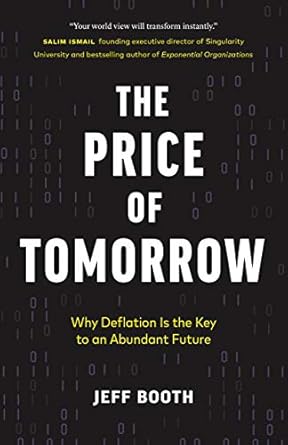In “The Price of Tomorrow”, Jeff Booth explores the inevitable impact of technological deflation on our global economy, challenging conventional notions of growth and inflation. Booth argues that advances in technology, from AI to automation, are driving down costs while governments attempt to counteract this with inflationary policies and rising debt. The book examines how these trends will reshape the future of work, income inequality, and the role of central banks, urging us to rethink our economic models in a world where abundance, not scarcity, defines progress. This blog dives into Booth’s bold vision for a sustainable, technology-driven future.
Here are 25 key lessons from “The Price of Tomorrow” by Jeff Booth.
1. Technological Deflation
In The Price of Tomorrow, Booth emphasizes that technological deflation is inevitable. As technology evolves, it drives down costs, making products and services cheaper over time.
2. Exponential Growth of Technology
The book highlights the exponential growth of technology in areas like AI, robotics, and blockchain, which will disrupt traditional economic models.
3. Economic Inflation vs. Deflation
Booth argues that governments are fighting a losing battle trying to control economic inflation. With technology pushing prices down, inflationary policies will become unsustainable.
4. Debt Accumulation and Economic Collapse
Rising national debt is another issue Booth covers. As governments attempt to stimulate economies with debt, it leads to an eventual economic collapse.
5. Shift in Labor Market
Technological advancements are causing a significant shift in the global labor market, rendering many traditional jobs obsolete.
6. Inequality Gap
Booth warns that unchecked technological advancement could widen the income inequality gap, with the rich benefiting more from automation than the middle or working class.
7. The Role of Government
Booth advocates for government reforms to adapt to a technology-driven deflationary environment instead of clinging to outdated inflationary models.
8. Unintended Consequences of Central Banks
The role of central banks in propping up economies through money printing and low-interest rates is leading to unintended negative consequences, according to Booth.
9. Understanding Bitcoin
The Price of Tomorrow explores the role of Bitcoin and other cryptocurrencies in a deflationary future, where traditional currencies lose their value.
10. Environmental Benefits of Technological Deflation
Booth points out that technological deflation can be beneficial to the environment by reducing resource consumption and lowering production costs.
11. Scarcity vs. Abundance
Technological advancements shift the economic paradigm from scarcity to abundance, as we can produce more goods at a fraction of the historical cost.
12. The Fallacy of Economic Growth
Booth challenges the conventional idea that economic growth is always positive, warning that chasing GDP growth at any cost is unsustainable.
13. Universal Basic Income (UBI)
With technology reducing the need for labor, Booth suggests that Universal Basic Income (UBI) could be a solution to economic inequality.
14. Recalibrating Education for a New Economy
As technology evolves, education systems must adapt to prepare future generations for a world driven by automation, AI, and robotics.
15. Financial Bubbles
Booth argues that financial bubbles, fueled by central bank policies, are becoming increasingly common and destabilizing global economies.
16. Trust in Institutions
In an era of rapid technological change, public trust in institutions like banks, governments, and corporations is eroding.
17. New Economic Models
Booth calls for the development of new economic models that better accommodate the deflationary forces driven by technological progress.
18. Productivity Gains and Job Losses
While technology boosts productivity, it also leads to significant job displacement, requiring society to rethink its economic structures.
19. The Future of Work
In the future, workforce dynamics will be drastically altered as more jobs are automated, and new forms of employment emerge.
20. Technological Monopolies
The Price of Tomorrow warns about the rise of technological monopolies and their power to control vast portions of the economy.
21. Short-Term Fixes, Long-Term Problems
Governments tend to apply short-term economic fixes, like stimulus packages, that worsen the long-term sustainability of the economy.
22. Adapting to Technological Change
Booth encourages businesses, governments, and individuals to actively adapt to technological change rather than resist it.
23. Artificial Intelligence
AI’s potential to transform industries is one of the key factors in driving deflation and reshaping the global economy.
24. Investment in Innovation
Booth stresses the importance of investment in innovation and research to prepare for a future dominated by technological change.
25. The Price of Tomorrow: Embrace or Resist?
Ultimately, Booth leaves readers with a choice: embrace technological deflation and rethink our economic system, or resist and face economic instability.
These lessons from The Price of Tomorrow address the core ideas of technological deflation, economic disruption, and the importance of preparing for a rapidly changing world. Incorporating SEO keywords like “economic deflation,” “technology-driven change,” “future of work,” and “financial bubbles” can help improve search engine rankings for your blog or content.
“Start Your Website Journey Today – Exclusive Hostinger Discounts!”







